Zendegi Read online
Table of Contents
Title Page
Copyright Page
PART ONE - 2012
Chapter 1
Chapter 2
Chapter 3
Chapter 4
Chapter 5
Chapter 6
Chapter 7
Chapter 8
Chapter 9
Chapter 10
PART TWO - 2027-2028
Chapter 11
Chapter 12
Chapter 13
Chapter 14
Chapter 15
Chapter 16
Chapter 17
Chapter 18
Chapter 19
Chapter 20
Chapter 21
Chapter 22
Chapter 23
Chapter 24
Chapter 25
Chapter 26
Chapter 27
Chapter 28
Chapter 29
Chapter 30
AFTERWORD
Also by Greg Egan from Gollancz:
AXIOMATIC
DISTRESS
LUMINOUS
PERMUTATION CITY
QUARANTINE
TERANESIA
DIASPORA
SCHILD’S LADDER
INCANDESCENCE
OCEANIC
Zendegi
GREG EGAN
Orion
www.orionbooks.co.uk
A Gollancz eBook
Copyright © Greg Egan 2010
All rights reserved.
The right of Greg Egan to be identified as the author of this work has been asserted by him in accordance with the Copyright, Designs and Patents Act 1988.
First published in Great Britain in 2010 by
Gollancz
The Orion Publishing Group Ltd
Orion House
5 Upper Saint Martin’s Lane
London, WC2H 9EA
An Hachette UK Company
This eBook first published in 2010 by Gollancz.
A CIP catalogue record for this book
is available from the British Library.
eISBN : 978 0 5750 8621 0
This eBook produced by Jouve, France
All characters and events in this publication are fictitious and any resemblance to real persons, living or dead, is purely coincidental.
No part of this publication may be reproduced, stored in a retrieval system or transmitted in any form or by any means, without the prior permission in writing of the publisher, nor to be otherwise circulated in any form of binding or cover other than that in which it is published without a similar condition, including this condition, being imposed on the subsequent purchaser.
www.gregegan.net
www.orionbooks.co.uk
PART ONE
2012
1
Martin stared anxiously at the four crates full of vinyl LPs in the corner of the living room. A turntable, amplifier and speakers sat on the floor beside them, their cables draped in dust; it had been three weeks since he’d sold the shelving unit that had housed the components. The records would be far too heavy to take with him on the plane to Iran, and he didn’t think much of their chances if he sent them separately as surface freight. He’d contemplated putting them in storage, as he’d done when he’d gone to Pakistan, but having already spent a month selling furniture and throwing out junk he was determined to complete the process: to reach the point where he could fly out of Sydney with no keys in his pocket, leaving nothing behind.
He squatted beside the crates and did a quick count. There were two hundred and forty albums; it would cost more than two thousand dollars to replace them all with downloads. That seemed like an extravagant price to pay in order to end up exactly where he’d started, give or take a few minor scratches and crackles. He could always just replace his favourites, but he’d been lugging these crates around for decades without discarding anything. They were part of his personal history, a diary written in track lists and sleeve notes; there were plenty of bizarre and embarrassing choices, but he didn’t want to forget them, or disown them. Whittling the collection down would feel like a kind of revisionism; he knew that he’d never part with money again for Devo, The Residents or The Virgin Prunes, but he didn’t want to tear those pages from his diary and pretend that he’d spent his youth entirely in the exalted company of Elvis Costello and The Smiths. The more obscure, the more dubious, the more downright cringe-inducing the album, the more he’d have to lose by excising it from his past.
Martin knew what he had to do, and he cursed himself for not facing up to it sooner. Normally he would have scoured the web for the pros and cons of different methods, then spent another week mulling over the choices, but he had no time to waste. The crates held almost seven days’ worth of continuous music, and he was flying out in a fortnight. It was not impossible, but he’d be cutting it fine.
He left his apartment and walked two doors down the hall.
At the sound of his knocking, Alice called out grumpily, ‘I’m coming!’ Half a minute later she appeared at the door, wearing a wide-brimmed hat, as if she was about to brave the afternoon sun.
‘Hi,’ Martin said, ‘are you busy?’
‘No, no. Come in.’
She ushered him into the living room and motioned for him to sit. ‘Would you like some coffee?’
Martin shook his head. ‘I won’t take your time; I just wanted some advice. I’m going to bite the bullet and put my vinyl on computer—’
‘Audacity,’ Alice replied.
‘Sorry?’
‘Download Audacity; that’s the best software to use. Plug your turntable preamp into your sound card, record everything you want and save it as WAV files. If you want to split each album side into individual tracks, you’ll have to do that manually, but it’s pretty easy.’ She took a small notepad from the coffee table and scribbled something, then handed him the page. ‘If you use these settings it will make life simpler if you decide to burn CDs at some point.’
‘Thanks.’
‘Oh, and make sure you get the recording level right.’
‘Okay.’ Martin didn’t want to appear rude, picking her brains and then rushing away, but since she hadn’t taken her hat off he assumed she was itching to get moving herself. ‘Thanks for your help.’ He rose to his feet. ‘It looks like you were going somewhere—’
Alice frowned, then understood. ‘You mean this?’ She took hold of the hat by the brim and pulled it off, revealing a mesh of brightly coloured wires tangled in her short dark hair. ‘I didn’t know who was at the door, and it takes me ten minutes to stick all the electrodes back on.’ Though it didn’t look as if any hair had been shaved off, irregular partings revealed patches of white skin to which small metal discs adhered. Martin had a disconcerting flashback to his childhood: grooming the family cat in search of ticks.
He said, ‘Can I ask what they’re for?’
‘There’s a Swiss company called Eikonometrics who want to see if they can classify images by flashing them on a monitor subliminally and looking at the viewer’s brain activity. I signed up for one of their trials. You just sit and work normally; you don’t even notice the pictures.’
Martin laughed. ‘Are they paying you?’
‘One cent per thousand images.’
‘That’ll catch on.’
Alice said, ‘I expect they’ll replace the micro-payments with some kind of privileges scheme. Maybe give people free access to games or movies if they’re willing to wear the electrodes while they watch. In the long run they’re hoping to get it working with a standard gamer’s biofeedback helmet instead of all this DIY-neurologist crap, but off-the-shelf models don’t have the resolution yet.’
Martin was intrigued. ‘So what’s your angle?’ Alice earned her living as a we
bsite designer, but she seemed to spend most of her spare time on mildly nefarious projects, like the ‘Groundhog Cage’ she’d constructed that made thirty-day free-trial software think it was always on the first day of the trial. Apparently this was harder than simply lying to the software about the true date; there were exchanges with distant servers to be faked as well.
‘I’m still analysing the system,’ she said, ‘trying to figure out how to game it.’
‘Right.’ Martin hesitated. ‘But if the experts can’t write software that classifies images as well as a human brain can, how are you going to write a program to simulate your own responses?’
‘I don’t have to,’ Alice replied. ‘I just have to make something that passes for human.’
‘I don’t follow you.’
‘People aren’t all going to react identically,’ she said. ‘There might or might not be a clear majority response to each class of image, but you certainly won’t get the same signal from everyone. Some participants - through no fault of their own - won’t be pulling their weight; that’s a statistical certainty. But the company wouldn’t dare discriminate against people whose brains don’t happen to go aaah every time they see a fluffy kitten; they’ll still get the same rewards. I want to see if I can ride the coattails of the distribution.’
‘So you’d be satisfied with passing as a low-affect psychopath, just so long as you don’t actually come across as brain-dead?’
‘That’s about it.’
Martin rubbed his eyes. Though he admired her ingenuity, there was something about her obsessive need to prove that she could milk the system that felt every bit as crass as the brain-farming scheme itself.
‘I’d better go,’ he said. ‘Thanks for the tips.’
‘No problem.’ Alice smiled, suddenly self-conscious. ‘So when are you flying out?’
‘Two weeks.’
‘Right.’ Her smile stayed awkwardly frozen, and Martin realised that it wasn’t her eccentric head-ware that was making her embarrassed. ‘I’m really sorry about you and Liz,’ she said.
‘Yeah.’
‘How long were you together?’
‘Fifteen years,’ he said.
Alice looked stunned; she’d been their neighbour for almost a year, but the subject had probably never come up before. Alice was in her mid-twenties; fifteen years would sound like a lifetime.
Martin said, ‘I think Liz decided that Islamabad was the last hardship post she was willing to put up with.’ He couldn’t blame her; Pakistan and Iran were not the most appealing locations for Western women with no reason of their own to be there. Liz worked in finance, for a company that didn’t mind where she lived so long as she had an internet connection, but Martin suspected that somewhere in the back of her mind she’d imagined that the years in Purgatory were going to be rewarded with Paris or Prague. Martin’s employers reasoned instead that his time in Pakistan was the ideal preparation for their new Tehran correspondent, and after twelve months slacking off as an online news editor in Sydney, a return to the field was long overdue.
‘I’m sorry,’ Alice repeated.
Martin waved her crib-notes in thanks and replied with a parody of a honey-toned late-night DJ from the eighties, ‘I’d better go spin some discs.’
Martin started with the Eurythmics’ Touch. He fussed over the cables and the software settings, checking and rechecking every option, and when he’d finished the recording he played back the entire album to be sure that everything had worked properly.
Annie Lennox’s voice still gave him goose-bumps. He’d only seen her performing live once, in a muddy field in the countryside north of Sydney in January 1984. Talking Heads, The Cure and The Pretenders had all played at the same festival. Unseasonal downpours had drenched the campgrounds and he could still remember queuing in the rain to use the unspeakable toilets, but it had all been worth it.
Martin had been eighteen years old then; he would not meet Liz for more than a decade. In fact, all of his vinyl predated her; by the time they moved in together he’d bought a CD player and now the soundtrack to their entire relationship was already on his hard drive, safely out of sight. These crate-loads of old music would carry him back to the era before her - and with the possible exception of Ana Ng, you couldn’t miss someone you hadn’t even met yet.
It was an appealing idea, and for a few hours he lost himself in Talking Heads, drinking in their strange, naïve optimism. But by late evening he’d started on Elvis Costello and the mood was turning darker. He could have hunted through the crates for something cheerier - there was a Madness compilation in there somewhere - but he was tired of steering his emotions. Even when the music simply made the years melt away, the time-tripping itself was beginning to leave him maudlin. If he kept this up for two weeks he’d be a wreck.
He continued with the recording marathon, flipping and changing the albums like pancakes, but he turned down the playback volume so he wouldn’t have to listen any more. Better to start thinking of the imminent future; Martin opened his browser and began catching up on the news from Iran.
The opposition group that had garnered the most attention in the run-up to the impending parliamentary election was Hezb-e-Haalaa, literally the ‘Party of Now’. Tongue-tied foreigners occasionally pronounced this almost indistinguishably from Hezbollah, ‘Party of God’ (not to mention confusing the Iranian Hezbollah with the Lebanese group of the same name), but the two could not have been more different. Among other things, Hezb-e-Haalaa had announced a policy of recognising Israel; as Dariush Ansari, the party’s founder, put it: ‘Iraq killed a million of our people in the war, but we now have normal diplomatic relations with them. In proposing the same with Israel, I am not giving my blessing to anything that nation has done, any more than our esteemed leaders who sent their ambassador to Baghdad were giving theirs to the invasion of our territory and the slaughter of our people.’
Ansari travelled with a bodyguard to discourage freelance zealots from physically rebuking him for this line of reasoning - and there was still a chance that his big mouth would get him sent to Evin Prison - but his positions on economic, legal and social reform were far less controversial and received substantial support in opinion polls. Even in a perfectly fair and open ballot, Hezb-e-Haalaa probably would not have won a majority in the Majlis - a body that had only limited power, in any case - but in combination with other reformists it could still have embarrassed the conservative president.
However, the final say on eligibility fell to the twelve-member Guardian Council, who had just declared every candidate who happened to belong to Hezb-e-Haalaa unfit to stand in the election. There would be no need to engineer the results to keep them out of the Majlis - risking fresh cries of ‘Where’s my vote?’ - now that they had been pre-emptively wiped right off the ballot.
The flight to Singapore left Sydney at the very civilised hour of nine a.m., but Martin had been up for forty-eight hours dealing with a plethora of last-minute tasks and his biological clock no longer recognised the distinction between good and bad times to travel. He spent the journey drifting fitfully in and out of sleep. Eight hours later as he strode through Changi Airport he still felt like a pared-down version of himself, an automaton with tunnel vision ignoring everything but signs that promised to take him closer to the right gate for Dubai. He actually had a ninety-minute layover, but he could never relax until he knew exactly where he had to be at departure time.
On the flight to Dubai the mental fog began to lift. He knew he’d have a headache for the next few days, but at least he was sure that he’d ticked everything off his list and wouldn’t have to send a stream of emails back to Sydney begging people to tie up loose ends for him. If the plane went down over the Indian Ocean he could drown in peace, with no fear of real estate agents blacklisting him in the afterlife for failing to dryclean his curtains.
The passenger in the seat beside him was a telecommunications engineer named Haroun who was headed for Abu Dhabi. When Ma
rtin explained that he was going to be covering the Iranian election, Haroun replied good-naturedly that he doubted it would be as newsworthy as the previous, presidential vote. Martin couldn’t argue with that prognosis; after the turmoil of 2009 this was likely to be the most tightly managed poll in decades. Still, no one believed that the fire beneath the ashes had been extinguished.
In his present state it was pointless re-reading his background notes on the election; he slipped on his headphones and started up iTunes. The music library software had provisions for storing cover art and he’d started out taking photos of each album himself, but it had been hard to get the lighting and the angles right, so he’d ended up grabbing images off the net instead. Many of the sleeves had also included lyrics, notes or extra artwork, but he hadn’t had time to digitise any of that. The day before he’d flown out he’d taken the crates to a charity shop in Glebe, but they’d told him that unless he had collectors’ items, vinyl wasn’t worth their shelf space. By now, it would all be landfill.

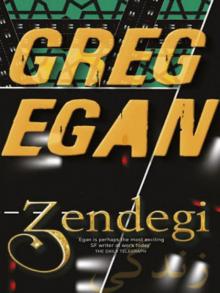 Zendegi
Zendegi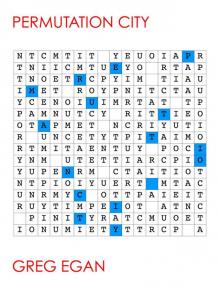 Permutation City
Permutation City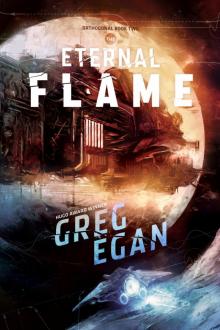 The Eternal Flame
The Eternal Flame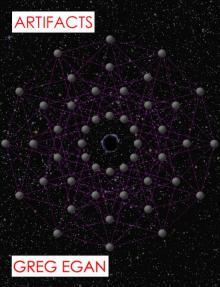 Artifacts
Artifacts Wang's Carpets
Wang's Carpets Dichronauts
Dichronauts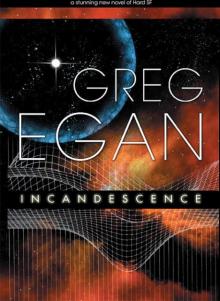 Incandescence
Incandescence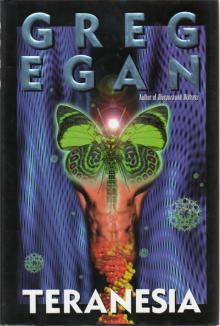 Teranesia
Teranesia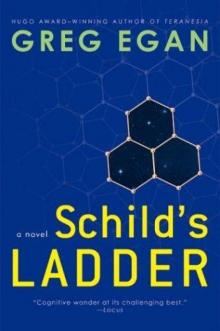 Schild's Ladder
Schild's Ladder Quarantine
Quarantine The Four Thousand, the Eight Hundred
The Four Thousand, the Eight Hundred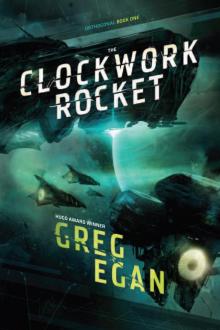 The Clockwork Rocket
The Clockwork Rocket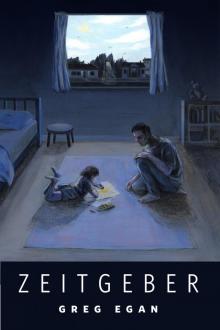 Zeitgeber
Zeitgeber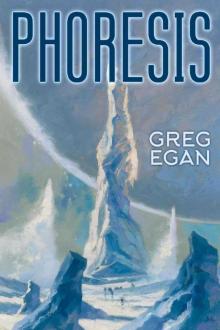 Phoresis
Phoresis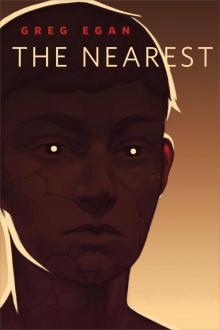 The Nearest
The Nearest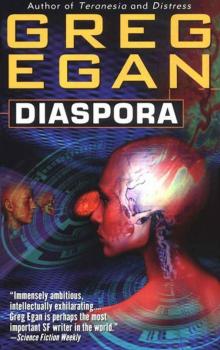 Diaspora
Diaspora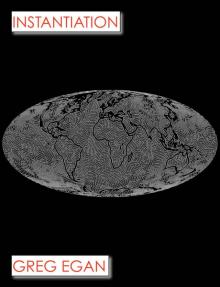 Instantiation
Instantiation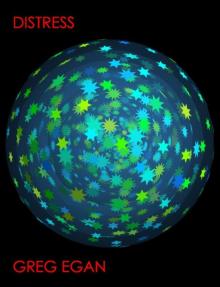 Distress
Distress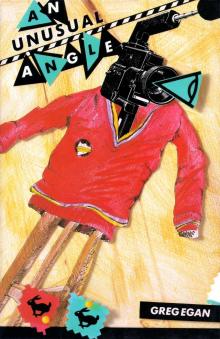 An Unusual Angle
An Unusual Angle Oceanic
Oceanic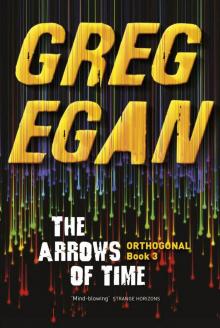 The Arrows of Time
The Arrows of Time Axiomatic
Axiomatic![Anthology 2. Luminous [1998, 2010] Read online](http://i1.bookreadfree.com/i/03/18/anthology_2_luminous_1998_2010_preview.jpg) Anthology 2. Luminous [1998, 2010]
Anthology 2. Luminous [1998, 2010]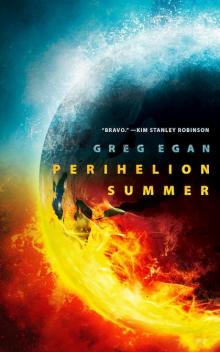 Perihelion Summer
Perihelion Summer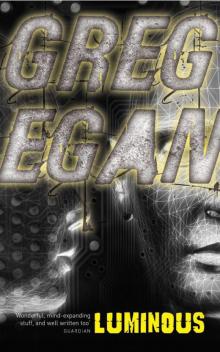 Luminous
Luminous